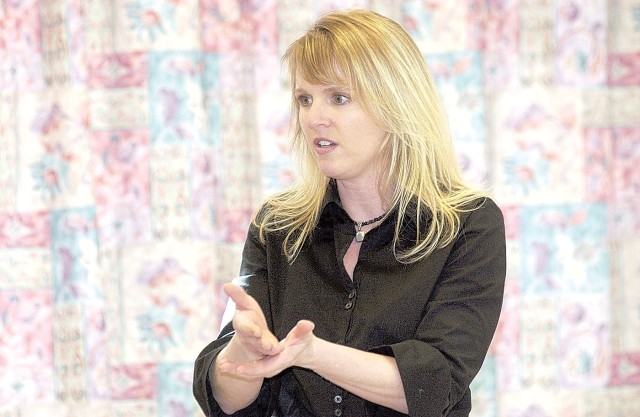
HEIDELBERG, Germany -- "It make me sad when someone sits in front of me who faces losses in their life, and they say they heard the information and thought it wouldn't happen to them," said Heather Robinson, U.S. Army Garrison Kaiserslautern's Employee Assistance Program coordinator.
Robinson was recently named the Prevention Coordinator of the Year by the Army Substance Abuse Program and will receive recognition in Dallas Aug. 22.
The award is quite an accomplishment for Robinson, a new employee with only eight months under her belt when nominated. Prior to working in the ASAP office in Kaiserslautern, she was a contractor for seven years with the Adolescent Substance Abuse Counseling Service.
"From the time she started here, she has attempted to not only meet but exceed basic requirements of her job," said Charles Austin, the clinical director for the USAG Kaiserslautern ASAP office. "She brings on board a lot of clinical knowledge."
As a prevention coordinator, Robinson is responsible for ensuring DoD employees, both Soldiers and civilians, have their annual substance abuse training.
She also helps coordinate substance abuse awareness campaigns, such as Red Ribbon Week.
In her office, she is now dual hatted and also works with the Employee Assistance Program, which, Robinson says, provides assistance to anyone facing difficulty on the job at home or simply with stress by linking them with the best provider.
The reason Robinson thinks she was nominated, though, was because of her work in a third area - the Risk Reduction Program, which involves collecting data and identifying risk areas and looking at community resources to reduce risk. She worked in the program until February.
"It's a pretty cool job," Robinson said. "I get to work with Soldiers ... they are open, receptive and willing to implement."
Surprised by the recognition, Robinson said she hopes to get better at her job. "The first year everything doesn't run as tight as you thought it should," she said.
Robinson cites the Soldiers and leaders in her community as the reason she was selected for the award.
"Probably the only reason for the award is the motivated Soldiers and leaders who care about the same things as I do - the health of their buddies."
The problem she sees is that many Soldiers have been exposed to information about alcohol and drug abuse, but they were never approached in a way that made them receptive to the information.
"Prime for Life gets you in a place that is receptive," Robinson says about a class that she teaches in her role as a prevention coordinator.
Prime for Life is "an alcohol and drug program for people of all ages," according to the Prime for Life Web site. "It is designed to gently but powerfully challenge common beliefs and attitudes that directly contribute to high-risk alcohol and drug use."
"It is a respectful and empowering program," Robinson said. "Soldiers come in the first day angry, and by mid-day they are asking questions, and on the second day they are saying praises about the class, saying the class should be taught in basic training."
One of the areas PFL focuses on is risk factors. For example, Robinson said 50 percent of Soldiers report a family history of alcohol and drug problems. Many Soldiers are risk takers she says, increasing their chances for unhealthy choices.
Despite the many risk factors, she said Soldiers are making good choices, citing a figure that 75 percent of Soldiers report not drinking and driving.
One area which Robinson gained notoriety was with the work she did on the most recent Red Ribbon Week campaign, Austin said. A highlight of the week was the Red Ribbon Run, which boasted 296 Soldiers who ran for three hours, Robinson said.
She also coordinated with the U.S. Air Force to join in the campaign.
"She collectively reaches out to the Air Force ... and other external players who can have an impact," Austin said. "The Red Ribbon campaign was a substantial success and impressed everybody," he said. "(Robinson) is well known in our community because of her extreme energy and her commitment to service."

Social Sharing